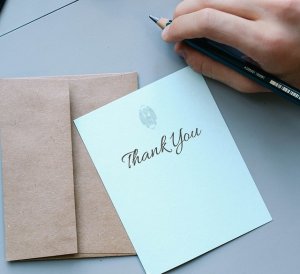If you make a stellar impression during your residency interview, a thank you not is probably not the thing that is going to get a residency program director to rank you highly. You’ve already made it to the top of their list. However, there are only one or two people that will perform this well, and other interviewees may be less memorable. A thank you card is not going to single-handedly get you into a residency program, but it doesn’t hurt. When residents ask whether or not to send thank you notes following an interview, the simple answer is, why not?

When NOT to Send a Note
Some residency programs specifically state that they do not want thank you notes sent following interviews. Abide by their wishes. Even if you are absolutely smitten with the program, an overzealous thank you note will not impress. It may even eliminate your chances at a residency slot because it shows you don’t like to follow instructions.
When to Send a Note
In cases where it is not stipulated, it is best to send a thank you note immediately following the interview and not more than one week afterward. You may want to wait one day to digest the information, but get it sent out early, especially if you know the program will be making a decision soon. If you wait too long, the people who interviewed you won’t remember your interview well enough to link it to your note.
Handwritten or Email

The jury is out on whether a handwritten or email thank you is preferable. Handwritten notes show that you went the extra mile, but they take time to get through the postal service and may never reach the program director’s desk. When they do get there, they are memorable because of their rarity. Email is generally accepted but requires less effort. Do what you feel is right, and stick to email when you know that directors are making their decisions soon.
Who to Send a Note
Send a thank you note to everyone who was at the interview. Each notes should be individually addressed with a unique note to that person, as they may be compared among the interviewers. Check with the program’s administrative assistant to make sure you have all the names correct, and ask the best way to make sure you reach them.
Reflection and Notes
One of the first things you should do when returning home from an interview is jot down some notes about things that went well with the interview or things that really stood out. It is the details that matter in the notes, and you don’t want to forget anything substantial. This will also help you reflect over the evening and have a well-constructed thought process to write about the program the next morning.
Content
Generally speaking, you want your note to be pretty simple. If it is too long-winded, busy program directors won’t have time to read all of it. Keep it to a three-part letter. The first part should be a thank you for the interview. The second should be some key reflections, and the third part should be your continued interest in the residency program.
Don’t Include These Thoughts
What should not be in your thank you note is anything negative under any circumstance. Even if it is gnawing at your consciousness, leave it out of the letter. Keep it positive, and don’t talk about the monetary benefits of the residency. This isn’t about anything other than your thanks and enthusiasm for the residency, so keep it short and sweet.
Worst-Case Scenario
In the worst-case scenario, your letter won’t reach its destination. This would most likely be because it was filtered by administration, or it was forgotten somewhere by the recipient. There is no guarantee that a thank you note will do anything, but even then, it does no harm. This is why it is good to write or email thank you notes. It can only help and is guaranteed not to do any harm.
Best-Case Scenario
In a best-case scenario, a thank you card opens an extended line of communication between you and the program director or other interviewers. In some cases, this has led to further discussion and near-guarantees of ranked positions. In other cases, it has made candidates memorable. A remembered face with an application generally outperforms a forgotten one. The best-case scenario is the whole point of sending a thank you note, and it is virtually risk-free.
A well-written thank you note can only be a positive aspectto your chances of being ranked for the residency program desired. Do make sure it is well-written. If this means having a friend or colleague edit it for you, make sure you enlist in their help. You want to make a good impression during your interview, but that impression can be confirmed through the follow up thank you note.